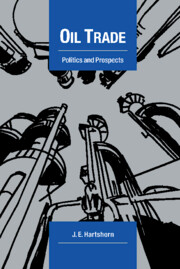Book contents
- Frontmatter
- Contents
- List of figures
- List of tables
- List of tabular boxes
- Preface
- List of abbreviations
- 1 Pause or plateau?
- 2 A discontinuity in trade
- 3 Cost: concepts and comparisons
- 4 Ambitions of autarky?
- 5 Still the prime mover
- 6 An industry restructured
- 7 Governments in the oil business
- 8 The Opec performance
- 9 A confusion of prices
- 10 Perspectives of supply
- 11 A contrast of expectations
- 12 A sustainable paradox?
- Appendix 1 What are oil reserves?
- Appendix 2 A note on energy and oil statistics
- Bibliography
- Index
1 - Pause or plateau?
Published online by Cambridge University Press: 27 January 2010
- Frontmatter
- Contents
- List of figures
- List of tables
- List of tabular boxes
- Preface
- List of abbreviations
- 1 Pause or plateau?
- 2 A discontinuity in trade
- 3 Cost: concepts and comparisons
- 4 Ambitions of autarky?
- 5 Still the prime mover
- 6 An industry restructured
- 7 Governments in the oil business
- 8 The Opec performance
- 9 A confusion of prices
- 10 Perspectives of supply
- 11 A contrast of expectations
- 12 A sustainable paradox?
- Appendix 1 What are oil reserves?
- Appendix 2 A note on energy and oil statistics
- Bibliography
- Index
Summary
During the last quarter of the twentieth century international oil ceased to be a growth industry. After more than a hundred years of expansion far faster than both energy in general and the rest of the world economy, it slowed down abruptly in the 1970s. In the eighties, with a short sharp decline followed by a halting recovery, it achieved no net growth at all. By 1992, it was only just about back to its level of 1979.
That may have been no more than a pause. The growth resumed after 1985 may be continuing, albeit uncertainly. By some physical measures, oil is still the world's biggest business. But it is in its third decade of relative decline compared with most other forms of energy. There is a distinct possibility that during the nineties this business will not grow much further. This reopens a recurrent question. Will its soaring historical trajectory soon level off onto a shallow dome or plateau over the next two or three decades, until ‘conventional oil’ – the qualities of crude oil that the industry has found it economic to produce so far – slides into gradual decline? (Even then, the world would in no sense be ‘running out of oil’. But it would already be moving on increasingly to other forms of petroleum that are more costly to produce, move or convert into the oil products that we are accustomed to use.)
In timing, at any rate, this slowdown was not inevitable. For many years past, there have been long-term predictions that this industry would pass its peak around the end of the century.
- Type
- Chapter
- Information
- Oil TradePolitics and Prospects, pp. 1 - 30Publisher: Cambridge University PressPrint publication year: 1993



